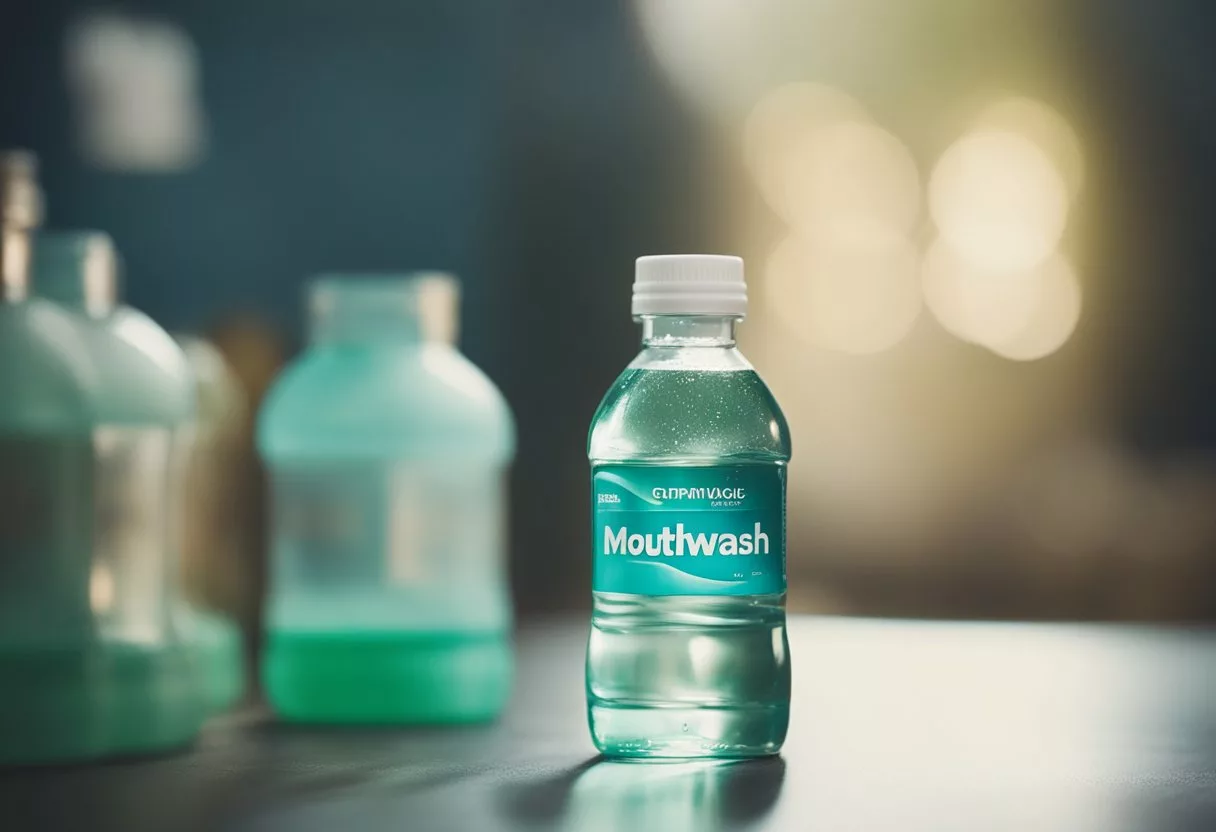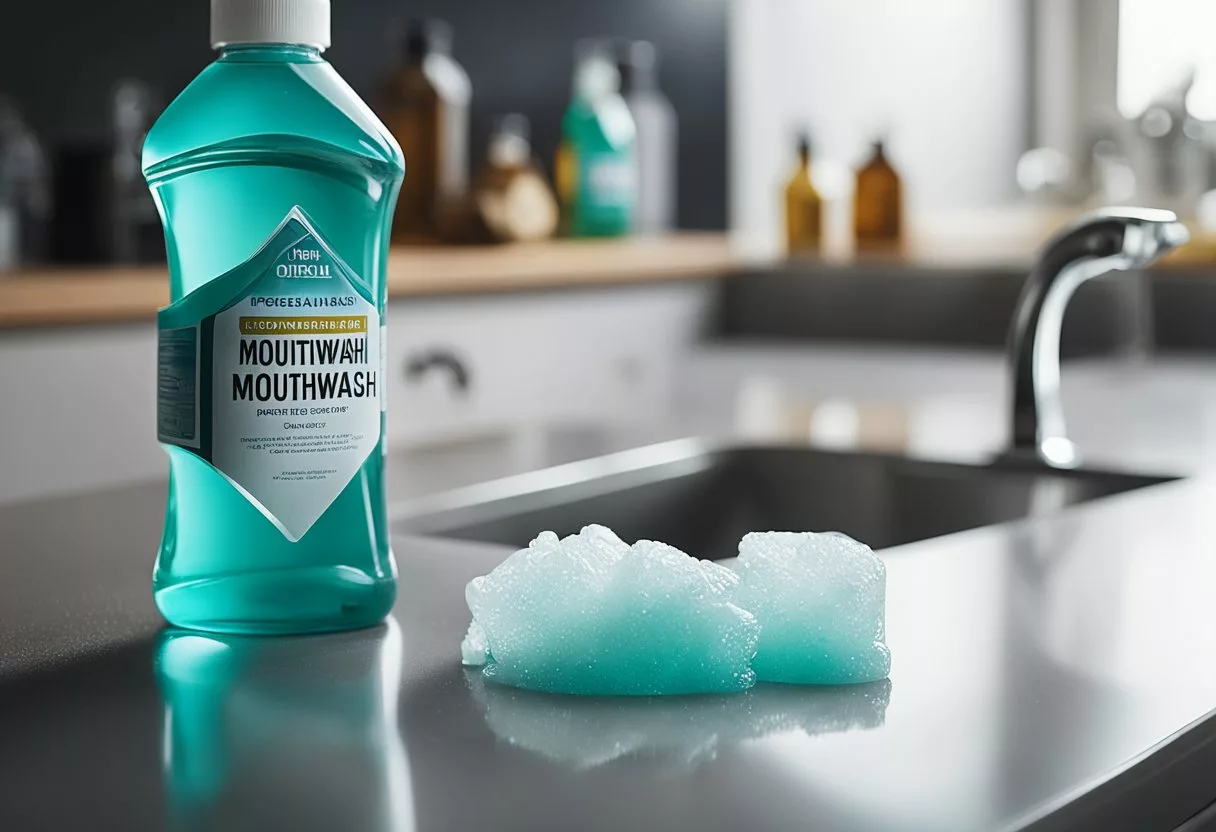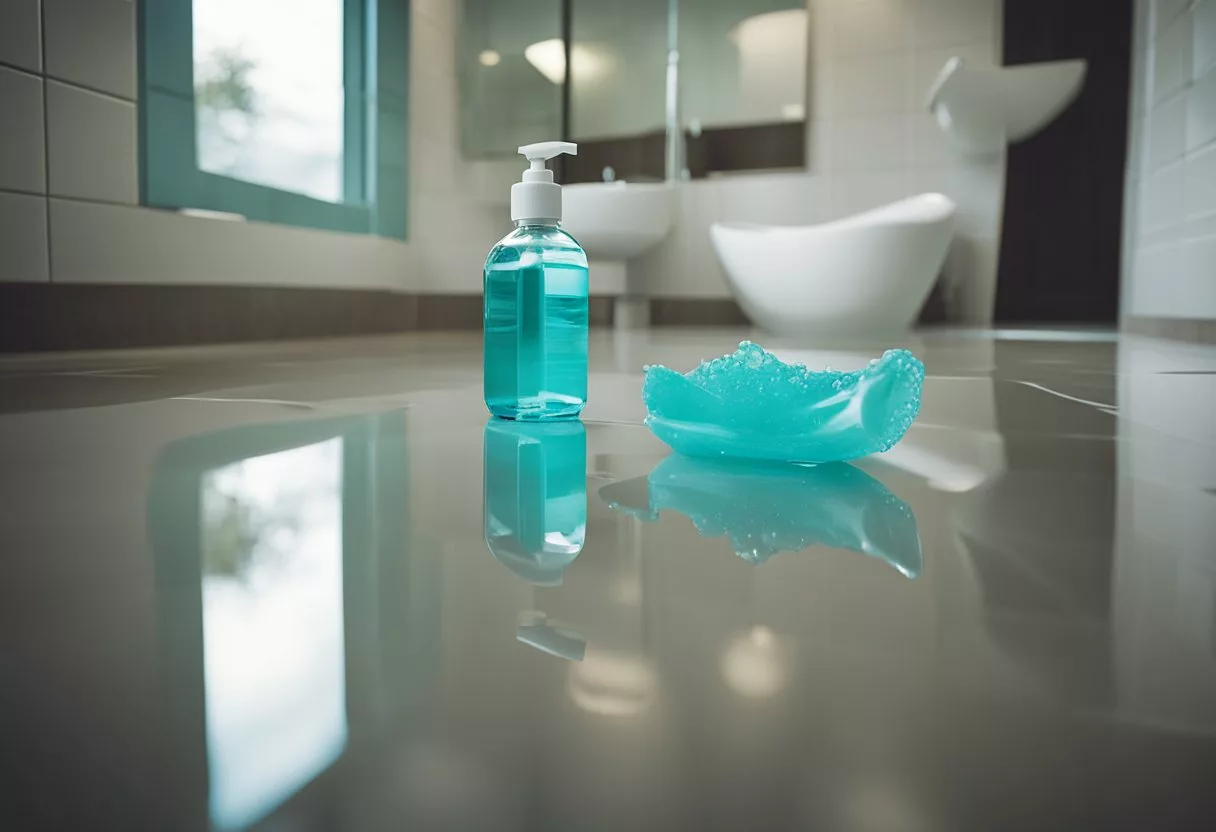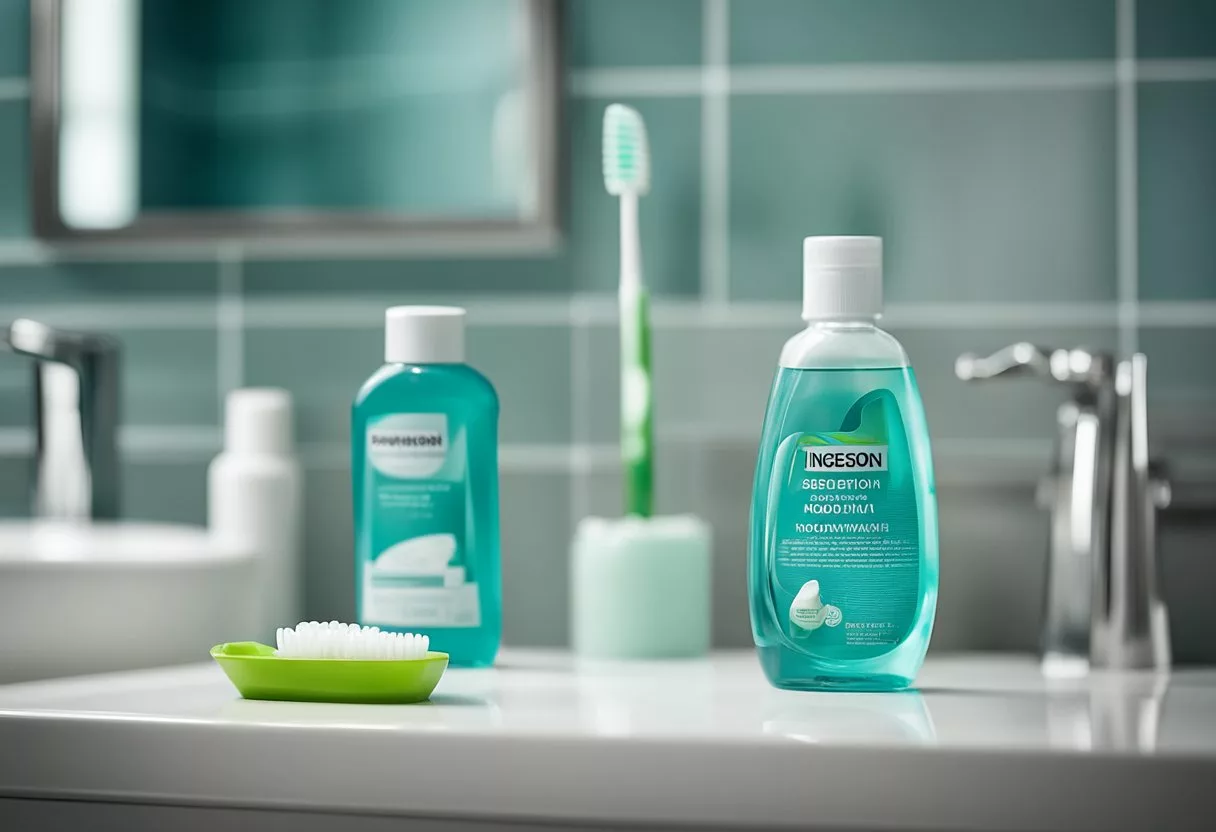Drinking mouthwash can be very dangerous. Many people don’t realize that mouthwash contains alcohol and other harmful chemicals. Swallowing large amounts of mouthwash can cause serious health problems, including organ failure, blindness, or even death.
Some people try to drink mouthwash to get drunk. This is extremely risky. The alcohol in mouthwash is not the same as in drinks. It can make you very sick. Mouthwash also has other ingredients that can disturb your body’s balance when swallowed.
If someone drinks a small amount of mouthwash by accident, they might be okay. But drinking more can lead to dizziness, trouble breathing, or convulsions. It’s important to use mouthwash safely and keep it away from children.
Key Takeaways
- Drinking mouthwash can cause severe health issues and should never be done intentionally.
- Mouthwash contains harmful chemicals not meant to be swallowed.
- Proper use of mouthwash involves swishing and spitting, not swallowing.
Composition of Mouthwash

Mouthwash contains a mix of active and inactive ingredients that work together to freshen breath and fight bacteria. The main components include antiseptics, flavoring agents, and sometimes alcohol.
Active Ingredients
Most mouthwashes use antiseptic compounds as their main active ingredients. Chlorhexidine gluconate is a powerful antiseptic found in some prescription mouthwashes. It kills bacteria and helps prevent plaque buildup.
Fluoride is another common active ingredient. It helps strengthen tooth enamel and prevent cavities. Many over-the-counter mouthwashes contain fluoride.
Essential oils like menthol and eucalyptol provide antimicrobial effects. They also give mouthwash its minty flavor and fresh scent.
Some mouthwashes use hydrogen peroxide as an active ingredient. It works as a mild bleaching agent and can help whiten teeth.
Alcohol Content in Mouthwash
Many mouthwashes contain ethanol (ethyl alcohol) as an ingredient. The alcohol content can range from 14% to 26.9% in different brands.
Alcohol acts as a carrier for other ingredients. It helps dissolve essential oils and flavors.
Alcohol in mouthwash also works as a preservative[1]. It extends the product’s shelf life by preventing bacterial growth.
The high alcohol content gives mouthwash its characteristic burning sensation when used. This effect makes some people believe it’s more effective at killing germs.
Non-Alcoholic Alternatives
Alcohol-free mouthwashes are available for those who prefer to avoid alcohol. These products use alternative ingredients to achieve similar effects.
Cetylpyridinium chloride is a common antiseptic used in alcohol-free formulas. It fights bacteria without the harsh effects of alcohol.
Some alcohol-free mouthwashes use natural ingredients like aloe vera or xylitol. These provide antimicrobial benefits and help freshen breath.
Non-alcoholic options are often gentler on the mouth. They may be a good choice for people with sensitive gums or those in recovery from alcohol addiction.
Risks of Ingesting Mouthwash

Drinking mouthwash can be very dangerous. It can cause many health problems, from mild discomfort to serious harm.
Symptoms of Mouthwash Overdose
Swallowing mouthwash can lead to several symptoms. These may include:
- Dizziness
- Drowsiness
- Nausea
- Vomiting
- Diarrhea
- Slurred speech
The severity of symptoms often depends on how much mouthwash a person drinks. Even small amounts can cause problems. Larger amounts increase the risk of serious effects.
Some people may drink mouthwash to get drunk. This is very risky. Mouthwash has a higher alcohol content than beer or wine. It can lead to alcohol poisoning quickly.
Serious Health Consequences
Drinking a lot of mouthwash can have severe effects. These may include:
- Trouble breathing
- Convulsions
- Organ failure
- Coma
- Death
Mouthwash contains toxic ingredients besides alcohol. These can harm the body’s systems. Regular use can lead to addiction and alcohol use disorder.
Mouthwash can disturb the body’s acid-base balance. This affects how organs work. In extreme cases, it may cause blindness or organ failure.
Particular Risks for Children
Children face extra dangers from mouthwash. Their smaller bodies are more sensitive to its effects. Even a small amount can be harmful.
Key risks for children include:
- Faster onset of symptoms
- Higher risk of alcohol poisoning
- Greater chance of serious complications
Many mouthwash bottles[2] now have child-resistant packaging. This helps prevent accidents. But it’s still crucial to keep mouthwash out of reach.
If a child swallows mouthwash, call poison control right away. Quick action can prevent serious harm. Never wait for symptoms to appear before seeking help.
Proper Use of Mouthwash
Mouthwash can help fight bad breath, reduce plaque, and prevent gum disease when used correctly. Proper technique and choosing the right product are key to getting the most benefits.
Recommended Oral Hygiene Practices
Mouthwash should be part of a complete oral care routine. Brush teeth twice daily with fluoride toothpaste for two minutes each time. Floss once a day to remove plaque between teeth.
Use mouthwash after brushing and flossing. This helps rinse away loose debris and delivers active ingredients to the whole mouth. For best results, rinse for 30-60 seconds.
Some dentists suggest waiting 30 minutes after brushing before using mouthwash. This allows fluoride from toothpaste to remain on teeth longer.
See a dentist regularly for checkups and professional cleanings. They can spot early signs of cavities or gum issues.
Instructions for Mouthwash Use
Read the label carefully and follow the directions. Most mouthwashes should not be swallowed.
Measure the correct amount, usually about 20 ml. Swish the liquid around the mouth for the recommended time, typically 30-60 seconds.
Gargle to reach the back of the throat[3]. This helps fight bad breath.
Spit the mouthwash out completely. Do not eat or drink for 30 minutes after use to let active ingredients work.
Never share mouthwash to avoid spreading germs. Replace the cap tightly after each use.
Alternatives to Alcohol-Containing Mouthwashes
Some people prefer alcohol-free mouthwashes. These can be gentler and don’t cause a burning sensation.
Natural mouthwashes use ingredients like essential oils. These may help freshen breath[2] without harsh chemicals.
Look for the American Dental Association (ADA) Seal of Acceptance. This shows a product is safe and effective.
For children under 6, use a fluoride-free mouthwash. Supervise kids to make sure they spit it out.
People with dry mouth may benefit from special rinses. These can help increase saliva production.
Talk to a dentist about the best mouthwash for specific dental needs like gingivitis or sensitivity.
First Aid and Treatment for Mouthwash Ingestion
Quick action is key when someone drinks mouthwash. The right steps can prevent serious harm. Medical help may be needed in some cases.
Immediate Actions to Take
Call the Poison Control Center[2] at 1-800-222-1222 right away. They can give expert advice. Don’t try to make the person throw up unless told to do so.
Give the person water to drink if they’re awake. This can help dilute the mouthwash.
Keep the mouthwash bottle to show doctors. Note how much was swallowed.
Watch for signs like dizziness, drowsiness, or trouble breathing. These need quick medical help.
Medical Interventions
Go to the emergency room[4] if symptoms are bad or a lot was swallowed.
Doctors will check vital signs and may do blood tests.
They might give activated charcoal to stop more mouthwash from being absorbed.
In rare cases, breathing support or kidney dialysis may be needed.
IV fluids can help flush out toxins.
Medicines may be given to treat symptoms or counteract the mouthwash.
Long-Term Recovery Measures
Most people recover fully with prompt treatment.
Follow-up tests may be needed to check for lasting effects.
Some may need rehab if alcohol was a factor in the incident.
Medication-assisted treatment could help those with alcohol issues.
Counseling might be useful to prevent future incidents.
Safe storage of mouthwash is key to avoid repeat events.
Impact of Mouthwash Abuse
Drinking mouthwash can lead to serious health problems and addiction. It contains high levels of alcohol and other chemicals not meant for consumption.
Signs of Misuse and Abuse
People who abuse mouthwash may show these signs:
- Breath that smells strongly of mouthwash
- Empty mouthwash bottles in trash or hidden areas
- Drunk-like behavior or intoxication
- Buying large amounts of mouthwash often
- Rapid heart rate and flushed skin
Some may experience a tingling sensation in their mouth. Long-term abuse can lead to organ damage, especially to the liver and kidneys.
Alcohol Abuse and Mouthwash
Mouthwash often contains more alcohol than beer or wine. People with alcohol use disorder may turn to it when other drinks aren’t available.
Risks of mouthwash abuse include:
- Alcohol poisoning
- Worsening of alcohol addiction
- Damage to the digestive system
- Increased tolerance to alcohol
The high alcohol content makes it easy to get drunk quickly on mouthwash. This can be very dangerous.
Preventive Measures and Safety
To prevent mouthwash abuse:
- Keep mouthwash in a locked cabinet
- Use alcohol-free mouthwash options
- Watch for signs of misuse in family members
- Educate about the dangers of drinking mouthwash
Child-resistant packaging helps prevent accidental ingestion by kids. Adults struggling with alcohol use should seek professional help. Safe use of mouthwash involves only rinsing and spitting, never swallowing.
Understanding Plaque and Tartar Control

Plaque and tartar are enemies of good oral health. Mouthwash can help fight these tooth-damaging substances and keep your mouth healthy. Let’s look at how mouthwash works against plaque and helps prevent gum disease.
Benefits of Mouthwash Against Plaque
Plaque is a sticky film that forms on teeth. It contains bacteria that can cause cavities. Mouthwash helps remove plaque in hard-to-reach areas. It can kill harmful bacteria that brushing might miss.
Many mouthwashes contain fluoride. This mineral strengthens tooth enamel. Stronger enamel is better at resisting decay caused by plaque.
Regular use of mouthwash can slow down plaque buildup. This makes it harder for plaque to turn into tartar. Tartar is a hard substance that only dentists can remove.
Preventing Gum Disease with Antiseptics
Antiseptic mouthwashes fight bacteria that cause gum disease. They contain ingredients like chlorhexidine. These kill germs and reduce plaque.
Some mouthwashes are made to treat gingivitis[5]. Gingivitis is an early stage of gum disease. These rinses can help reduce gum inflammation and bleeding.
Using an antiseptic mouthwash daily can:
- Reduce plaque buildup
- Kill bacteria between teeth
- Freshen breath
- Help prevent gum disease
It’s important to note that mouthwash doesn’t replace brushing and flossing. It works best as part of a complete oral care routine.
Mouthwash as Part of Oral Hygiene Regimen

Mouthwash plays a key role in maintaining good oral health. It helps fight bad breath and reduce plaque buildup when used correctly with other dental care habits.
Combining Mouthwash with Brushing and Flossing
Brushing and flossing are the main ways to clean teeth and gums. Mouthwash adds extra protection[6] against germs and bad breath.
To use mouthwash properly:
- Brush teeth for 2 minutes
- Floss between all teeth
- Rinse with mouthwash for 30 seconds
- Spit out, don’t swallow
This routine helps remove food bits and plaque. It also kills germs brushing and flossing may miss.
Using mouthwash twice daily can boost oral health. It reaches areas that are hard to clean with a toothbrush alone.
Choosing the Right Mouthwash
Not all mouthwashes are the same. Some fight bad breath, while others prevent tooth decay.
Types of mouthwash:
- Fluoride: Strengthens tooth enamel
- Antiseptic: Kills bacteria
- Cosmetic: Freshens breath only
People with sensitive teeth or gums should pick alcohol-free options. These are less harsh on the mouth.
Some mouthwashes contain high alcohol levels[7]. This can dry out the mouth if used too often. A dentist can suggest the best type for each person’s needs.
Always check the label. Follow the instructions on how much to use and how often.
Frequently Asked Questions
Drinking mouthwash can have serious health consequences. The ingredients in mouthwash can be harmful when swallowed in large amounts or over time.
Is it safe to swallow a small amount of mouthwash?
Swallowing a tiny amount of mouthwash by accident is usually not dangerous. Most people won’t experience any issues from ingesting a small sip.
However, it’s best to spit out mouthwash completely after rinsing. Frequent swallowing of even small amounts is not recommended.
Can ingesting mouthwash lead to poisoning?
Yes, drinking large amounts of mouthwash can cause poisoning. The high alcohol content in many mouthwashes can lead to alcohol poisoning if consumed in excess.
Other ingredients like fluoride can also be toxic in large doses. Symptoms of mouthwash poisoning may include dizziness, drowsiness, and difficulty breathing.
What are the risks of consuming mouthwash daily?
Regular mouthwash consumption can have serious health effects. Drinking mouthwash daily may cause organ damage, especially to the liver and kidneys.
It can also irritate the digestive system and potentially lead to alcohol dependence. Long-term use may result in malnutrition and other health problems.
What should you do if a child ingests mouthwash?
If a child drinks mouthwash, stay calm and call poison control immediately. Do not induce vomiting unless instructed to do so by a medical professional.
Monitor the child for symptoms like drowsiness or difficulty breathing. Seek emergency medical care if severe symptoms occur.
Are there any hazardous ingredients in mouthwash that can cause harm when ingested?
Mouthwash contains several potentially harmful ingredients. Alcohol is a common concern, but other ingredients can also be dangerous if swallowed in large amounts.
These include fluoride, chlorhexidine, and hydrogen peroxide. These substances can irritate the digestive system and cause more serious health issues[8] if ingested in high doses.
How does the body react to accidental ingestion of mouthwash?
Accidentally swallowing a small amount of mouthwash usually causes minor stomach discomfort. The body may experience temporary irritation in the digestive tract.
In rare cases, ingesting mouthwash might lead to nausea or stomach pain. If large amounts are consumed, more severe reactions like dizziness or breathing problems could occur.
References
- What Happens if You Drink Mouthwash? Effects & Dangers. https://www.doverecovery.com/blog/mouthwash-effects-dangers Accessed October 23, 2025
- Mouthwash: Swish and Spit. https://www.poison.org/articles/mouthwash Accessed October 23, 2025
- How to Use Mouthwash Safely and Properly: What You Need to Know. https://www.healthline.com/health/how-to-use-mouthwash Accessed October 23, 2025
- What to Do if I Swallowed Mouthwash?. https://crest.com/en-us/oral-care-tips/mouthwash/what-to-do-if-you-swallow-mouthwash Accessed October 23, 2025
- 7 Mouthwash Myths Debunked. https://www.wdfdental.com/blog/7-mouthwash-myths-debunked Accessed October 23, 2025
- General Dentistry Question: Should I Use Mouthwash That Has Alcohol?. https://www.arcdentistry.com/blog/general-dentistry-question-should-i-use-mouthwash-that-has-alcohol/ Accessed October 23, 2025
- Drinking Mouthwash: Can It Kill You?. https://www.newmouth.com/blog/drinking-mouthwash/ Accessed October 23, 2025
- Accidentally Swallowed Mouthwash: Cause for Concern? — Burlington Dental Center. https://burlingtondentalcenterks.com/swallowed-mouthwash Accessed October 23, 2025
